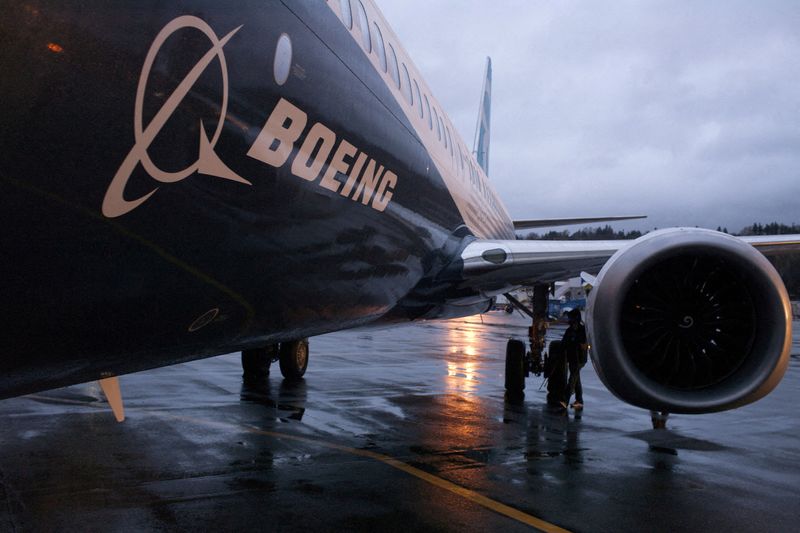By Mike Stone
WASHINGTON (Reuters) - Boeing (NYSE:BA) CEO Kelly Ortberg anticipates the planemaker's defense business will continue to struggle under the weight of budget-busting older contracts, but he said on Wednesday that despite many problems the unit making helicopters, fighter jets and missiles remains "core" to the company's future.
Cost overruns at the KC-46 midair refueling tanker program have surpassed $7 billion in recent years, while another fixed-price contract to upgrade two Air Force One planes has created a $2 billion loss for the top 5 U.S. defense contractor.
Boeing shares dropped 1.76% on Wednesday after the planemaker reported a quarterly loss of $6 billion, pressured by a five-week strike and problems in airplane manufacturing.
The Boeing Defense, Space & Security unit needs to replace a CEO who left last month. It has also been hobbled by expensive mistakes at its space unit.
Boeing's Starliner spacecraft has been hindered for years by development delays and technical problems with over $1.8 billion in private cost overruns. Two NASA astronauts that the company brought to the International Space Stations remain stuck there, scheduled to return in February on a craft from rival SpaceX. Boeing has struggled to provide a second ride.
Boeing also faces pressure to cut costs in its multibillion dollar SLS rocket contract with NASA, which is billions over budget and years behind schedule.
Ortberg, responding to questions about divestitures in its defense business, called it "core" on Wednesday's earnings call with Wall Street analysts, but noted the company wants to do a better job at fewer things.
"Clearly our core of commercial airplanes and defense systems are going to stay with the Boeing company for the long run," Ortberg said.
As the cash-strapped company has battled multiple crises, including a strike and the prolonged grounding of its 737 MAX aircraft, better management and more discipline was needed, Ortberg said.
The company would get better at estimating costs and possibly exit ongoing competitions for new defense contracts in order to find a more profitable path forward, he said.
In the just-reported third quarter alone, cost overruns on several fixed price Air Force contracts including the new Air Force One and training fighter jets created a $2 billion loss for the unit.
"Even if we wanted to, I don't think we can walk away from these contracts," Ortberg told Wall Street analysts on a post earnings conference call.
The big defense contractor is already in talks to sell its rocket-launching joint venture with Lockheed Martin (NYSE:LMT), United Launch Alliance. Insitu, a drone business, has also been slated for divestiture, but Boeing has not formally launched the sale process, two people familiar with the situation said.
A Boeing spokeperson declined to comment on the divestitures.
Boeing recently sold its Digital Reciever Technology (DTS) business to France's Thales SA for about $100 million.
But two sources told Reuters the executive suite is too busy and understaffed to speed up ongoing divestitures at its space and defense unit, or to prepare data on other units for possible sale despite desperately needing the cash.
The CEO of Boeing Defense Ted Colbert left the company last month.

Ortberg himself said, "we are somewhat consumed with the challenges of today." He gave himself until year end to get his arms around the company.
Boeing's Boeing Defense, Space & Security unit encompasses a wide range of products and services, including military aircraft, drones, satellites, weapons systems, missile defense, and space exploration. Some of the key components of the BDS business include the F-15 and F/A-18 fighter jets, Apache and Chinook helicopters, the KC-46 tanker, and various space and satellite systems. (This story has been corrected to fix the spelling of Ortberg in paragraph 12)